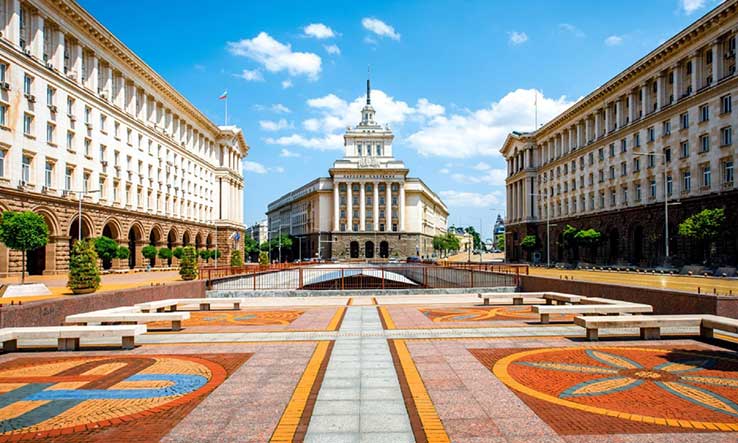Radosveta Vassileva

2021 marked the end of Boyko Borissov’s presence in Bulgaria’s executive as well as his dominance over the country’s parliament. However, did it dismantle Borissov’s autocracy? Far from it!
This year Bulgaria saw three parliamentary elections. It was only after the third parliamentary election in November 2021 that the new heterogeneous majority was able to find some common ground and finally agree on a Borissov-free coalition government. Оn 13 December 2021, the current 47th National Assembly elected a cabinet led by Kiril Petkov, leader of the newly formed Produlzhavame promyanata party (We will continue the change; PP), and composed of vibrant, but unlikely partners – There Are Such People (ITN), the Democratic Bulgaria coalition (DB), and the Bulgarian Socialist Party (BSP).
To what extent this coalition of all colors of the political spectrum will be able to tolerate their differences and stay together is already a challenging question to answer. More importantly, while these parties seem enthusiastic and send optimistic messages to the public, it is unclear how prepared they are to demolish the terror machine (uncontrollable Prosecutor’s Office; politically dependent courts; and an anti-corruption commission shielding corruption) built by Borissov’s GERB party and its allies which is still under the control of the latter.
Turbulent Times
In 2020, Bulgaria saw mass protests against the rampant corruption and disregard for the rule of law by Boyko Borissov’s third government and General Prosecutor Ivan Geshev who is perceived by many as a puppet of Borissov and his allies. These protests woke up some international media and European Union (EU) institutions which finally acknowledged the dire state of affairs in Bulgaria. The most influential media in Brussels, Politico, overtly called Bulgaria ‘a mafia state’.
The EU Parliament issued a powerful resolution against the rule of law deficiencies in the country. Among its critical observations, the EU Parliament noted its ‘regret’ that “the developments in Bulgaria had led to a significant deterioration in respect for the principles of rule of law, democracy, and fundamental rights, including the independence of the judiciary, separation of powers, the fight against corruption and freedom of the media”. Yet, despite local and international public pressure, Borissov’s government and Ivan Geshev stubbornly refused to resign.
Borissov’s GERB party geared up for the regular parliamentary elections in March 2021. However, this is when it received its first harsh blow by Bulgarian voters – while it came in first, three opposition parties that had not been part of the previous parliament (ITN, DB, and Stand Up! Mafia Out!) also entered parliament and made it impossible for Borissov to form a government. Sadly, these opposition parties did not have the necessary 121 parliamentary seats to elect their own cabinet either, so President Rumen Radev appointed a caretaker government and Bulgaria headed for a snap election in July 2021.
 Source: novatv.mk
Source: novatv.mk
At this election, Borissov received an even bigger slap since his GERB party came in second, but this time the opposition parties got caught up in their own ambitions and disagreements and failed to nominate a cabinet. President Radev was forced to appoint a new caretaker government and schedule a new snap parliamentary election in November 2021 when he himself was planning to run for a reelection at the regular presidential election this year.
A November to Remember
The parliamentary and presidential elections in November put an end to the agony of waiting when Borissov’s GERB party will be ousted from the executive for the foreseeable future. President Radev convincingly won the second round of the presidential election against GERB’s candidate Anastas Gerdjikov by an impressive margin of 34.92%. This is a huge relief for Bulgaria’s civil society – if the country heads for a snap parliamentary election in the near future, a caretaker government will be appointed by Radev. This impedes GERB from trying to regain back power through the back door.
More importantly, the parliamentary election, which took place on 14 November 2021, was won by the PP party which was formed shortly before the November election by two ministers in the first caretaker government that President Radev appointed this year – Kiril Petkov and Assen Vassilev. Nevertheless, as they earned merely 25.67% of the vote, it was clear that tough negotiations were ahead. The PP party extended a hand to everyone apart from GERB, their behind-the-curtain ally DPS, and the new far-right party Vuzrazhdane (Revival). They found themselves in talks with parties that have profound political differences and conflicts among one another:
-
BSP (socialists, heirs of the Bulgarian Communist Party);
-
The DB Coalition, which is already an impressive mix of green (The Green Movement), right (Democrats for a Strong Bulgaria) and a party which presents itself as center-right, but usually sends leftist messages (Yes, Bulgaria!);
-
ITN (Slavi Trifonov’s populist party which is difficult to place on the traditional political spectrum because, depending on the topic, their policies vary vastly).
In other words, the PP party had a mammoth task – they had to convince people who normally do not even communicate properly with one another to agree on a joint cabinet in the name of dismantling Borissov’s autocracy.
A Slow but Promising Start
The PP party surprised Bulgarian citizens with an attempt for greater transparency which Bulgaria desperately lacks. First, part of their negotiations for a cabinet were streamed live according to a pre-announced schedule. Second, the PP party insisted that the coalition agreement be in a written form. The Agreement and its attachments have been posted online for everyone to see. Unfortunately, the Agreement is exceptionally short, vague, and full of wishful thinking. On a positive note, the Agreement contains some elements which prove an intent for reforms. Its Annex 19 pinpoints the legislative initiatives which will be undertaken. А quick look shows that these are aimed at solving longstanding issues in Bulgaria, such as reforming the institutions which traditionally whitewash corrupt politicians and harass inconvenient opponents of Borissov’s regime – the Prosecutor’s Office, the Anti-Corruption Commission, the Specialized Criminal Courts, etc.
Since I am writing for a Macedonian audience, it should be pointed out that some of the other Annexes to the Agreement concern Bulgarian-Macedonian relations. Annex 4 on ‘Transport’ envisages the development of transport links between Bulgaria and Macedonia, Annex 12 on ‘Regional Development’ envisages developing the rail link between Bulgaria and Macedonia, and Annex 18 on ‘International Relations’ contains lengthy but vague details about the future of Bulgarian-Macedonian relations. On the latter issue, it is obvious that the coalition parties were walking on eggshells and tried to appease all segments of Bulgarian society. One may safely say that the question of the infamous veto on Macedonia’s EU membership is a hot potato with which the new government is reluctant to deal quickly.
Too Early for Celebrations
While there are many reasons for optimism – the main one being that Borissov’s autocracy has started to crumble – it is too early to celebrate the end of an autocratic era. Borissov’s three governments have inflicted tremendous damage on Bulgaria through rampant corruption, reforms compromising the rule of law, and the creation of institutions aimed at protecting the status quo. Dismantling such a ‘Frankenstate’ requires courage, knowledge, patience, and persistence, but also awareness that Borissov and his circle do not play fair and may use behind-the-curtain methods to prevent reforms, such as Faustian bargains.
Kiril Petkov’s current government has a potential to make history, but only the future will show if it has the full package to handle the challenge and to respond to public expectations about reforms. In this light, the next three months will be pivotal because they will demonstrate if the coalition is able to deliver on its short-term promises. The new Minister of Justice Nadezhda Yordanova has presented an ambitious program aimed at removing two key people in Borissov’s autocracy from office in the next few months – General Prosecutor Ivan Geshev against whom citizens protested for months and the Head of the Anti-Corruption Commission Sotir Tsatsarov who previously served as General Prosecutor and who promoted Geshev. If Minister Yordanova is successful at this task, the coalition will certainly gain even greater popularity among civil society and will prove it knows not only how to talk the talk, but also how to walk the walk.
‘Don’t count your chickens before they hatch’ is a traditional English proverb which has a direct equivalent in Bulgarian – ‘The chickens should be counted in September’. Ironically, one can suspect that by September 2022 there will be better clarity if this new government will indeed last because of its successful reforms aimed at promoting the rule of law or Bulgaria will be headed for new snap parliamentary elections again.
Please refer to the Terms before commenting and republishing the content.
Note: The views and opinions expressed in this article are those of the author and do not necessarily reflect the views of the Institute of Communication Studies or the donor.


